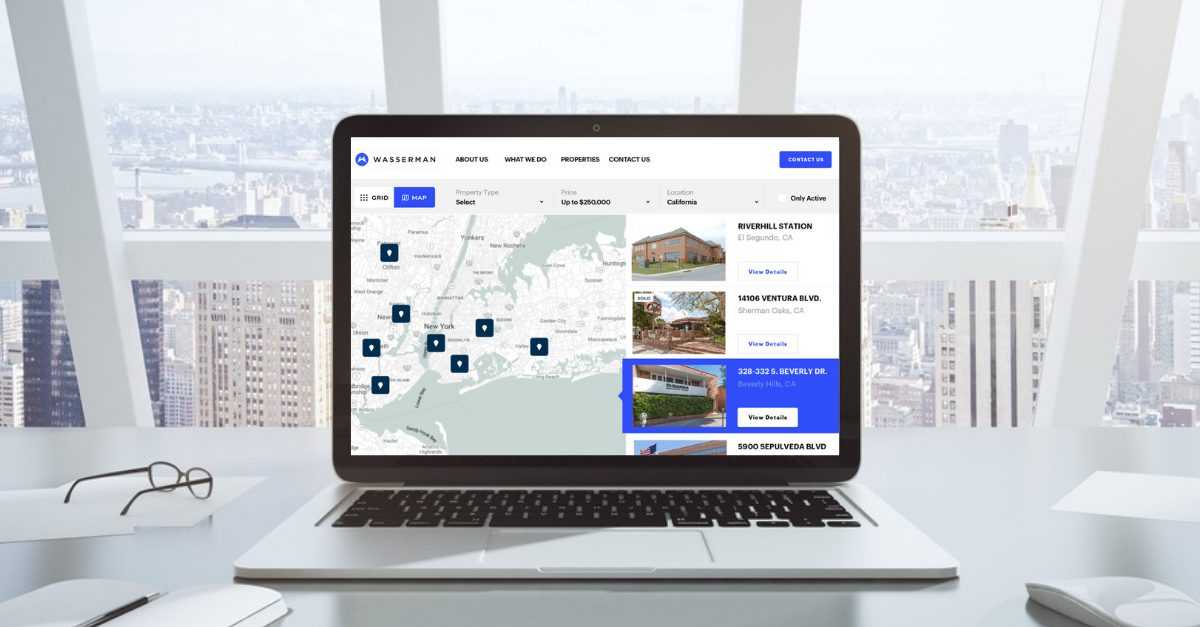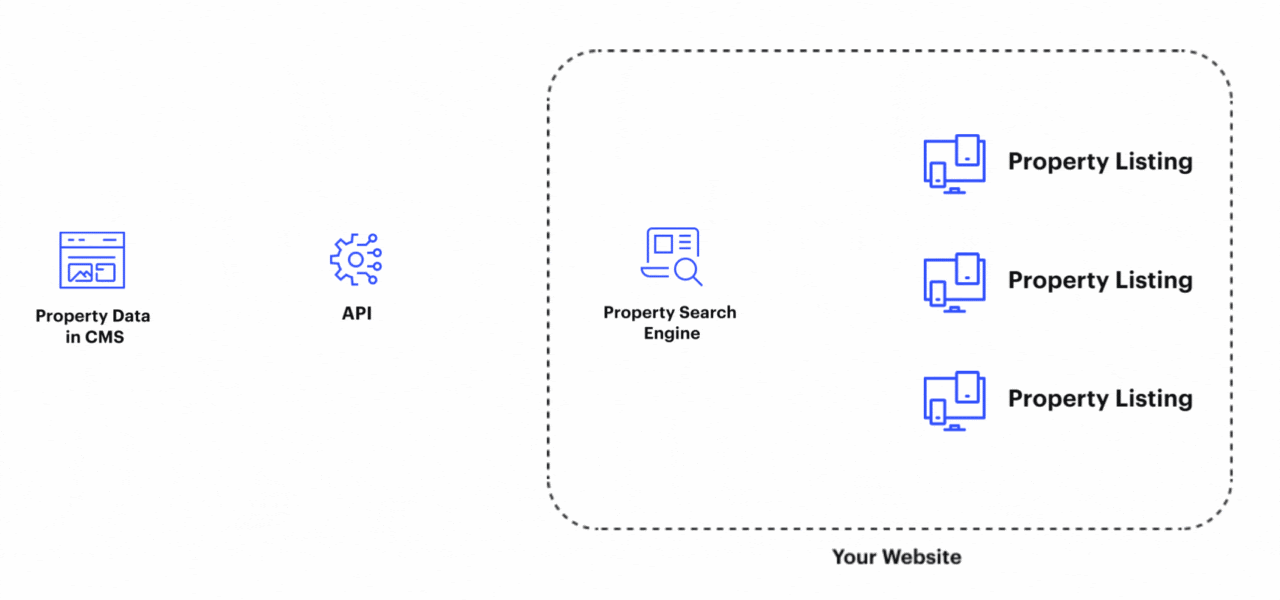
CRE Technology
How to Build a Commercial Property Search Engine (PSE): Complete Guide
When potential tenants and investors find your commercial real estate company online, they aren’t necessarily wondering about your company history or team’s background. They want to know what you can offer them now. In fact, about 80% of the time spent on a CRE website is on the properties section of your company website.
That means if you are not making it easy to find, search and view your available property listings, you are at a competitive disadvantage.
Lacking a commercial property search engine is a little like a merchandise company having a website without a products page.
Fortunately, the reverse is true. Having a commercial real estate search engine that aggregates and displays all of your current inventory delivers some serious benefits.
Why Should I Include Property Search on My Website?
You don’t want to have to market your properties individually at every turn. You also need a way to display your entire portfolio. With a commercial property search engine, you compile all of your listings into one place.
Displaying your full inventory provides significant advantages:
- Create trust among the CRE community
- Turn website visitors into leads
- Boost engagement and create a memorable experience for prospective clients
- Improve search engine optimization (SEO) to maximize visibility on Google
- Extend the digital footprint of your property listings
- Elevate your brand
That’s true of most all commercial real estate search engines, but different options can deliver additional benefits.
How Do I Add Properties to My Website?
There are several ways to add and display your property listings to your own company website. To start, you need to choose one of the three paths below for displaying your available listings that will also give features specific to the option you choose:
- Use a turnkey platform. Choose a “plug and play” marketing platform that automates the creation of your search engine. With this option, you can significantly reduce costs and time-to-market because you won’t need to hire a web design agency to build it from scratch. In addition, you take advantage of ongoing software improvements which means less maintenance and headaches to worry about.
- Hire a website design agency. If you hire an agency to build a custom property portal, you can ensure that the branding on the search engine is consistent with your company’s other marketing efforts. With this option, you’ll get all of the features you want paired with the proper branding, but it also means time and money for initial setup, plus ongoing costs whenever you want to make changes.
- Employ an internet data exchange (IDX). This feed essentially pulls listings from a database to your website. The downside here is that IDX solutions pull properties from the MLS which is heavily focused on residential properties . Plus, choosing this route means everything on the IDX shows up on your site, which could include properties in your market that you don’t own.
These days, most CRE companies utilize a turnkey platform that includes a WordPress listing plugin, providing various customization and integration options — API, embed widget, or inline frame (iframe).
An API integration will give you the highest level of customization and control, but will require some initial implementation work.

To ensure your search engine delivers maximal benefit for your company with minimal drawbacks, you should look for one that delivers all of the key features you might want.
What Features Should I Consider?
Before implementing a property search or inventory plugin, there are several characteristics to consider:
- Ease of use (how quickly can you add or remove listings )
- Filtering options so users can refine their search among your available listings
- Display options such as map and grid views
- Customization capabilities to match your design preferences
- Quality of individual property listings
- Syncs seamlessly with your marketing platform for lead capture
- Maps to your own domain to prevent website visitors from leaving your site
- Displays closed transactions with no additional work
To give you an idea of what your company search engine could look like when beautifully designed and feature-rich, check out these property search engine examples.
Can I Display Properties Listings on My Own Domain?
There are several ways to integrate your property search engine on your own website, and the way you do it depends on the technology you use. That tech will also determine how the property search engine and your property listings will be linked to your own website domain.
First, you need to figure out what you want to call the property search engine section on your website. Common names include:
- Listings
- Properties
- Availabilities
Then, you need to determine how you want to map the individual properties to your website domain. In other words, you want to figure out where someone goes when they click on one of the availabilities they see in your commercial property search engine.
Your options here are:
- Keep them on your company domain. That means that the user never leaves your site, even as they explore any listing from your search engine. So, for example, when they click on Property X from the search engine, they’ll head to a webpage with a URL like yourcompany.com/propertyx
- Put them on a subdomain. If you want to host the individual property pages within the realm of your website but still differentiate them for marketing purposes, you can use a subdomain. In this case, the user would click on Property X from the search engine and be directed to propertyx.yourcompany.com. These more differentiated links can help you market your individual properties with a more memorable web address.
- Send them to an external provider’s subdomain. If you choose a turnkey platform that doesn’t link your listings to your company website, you could send someone who clicks on Property X outside your website to a domain like loopnet.com/yourcompany/propertyx. At that point, the user has left your website and could stumble across other listings from other CRE companies as they navigate around the external provider’s website.
In the vast majority of cases, your company will be best off keeping the users on a domain that you own. Otherwise, you risk them seeing content from someone else that could catch their eye.
Moving Forward with the Right Option
Clearly, there’s a lot to consider when it comes to building the right commercial property search engine for your company.
You need something that will be easy to use so you can get listings to market fast. You also need a way to retain users on your website and deliver consistent branding whether they’re looking at your search engine — and when they click through to an individual property.
Related Blog Posts
Marketing Best Practices
Marketing Toolkit for Real Estate Investment Sales
As an investment sales team in commercial real estate, having the right tools at your...
Company updates
Avison Young Selects SharpLaunch as Exclusive CRE Marketing Solution Across U.S. and Canada
SharpLaunch delivers a unified global marketing experience and seamless integration,...
CRE Technology
How to Integrate SharpLaunch with Salesforce
While Salesforce is a powerful CRM, it’s not specifically designed for the unique needs...

